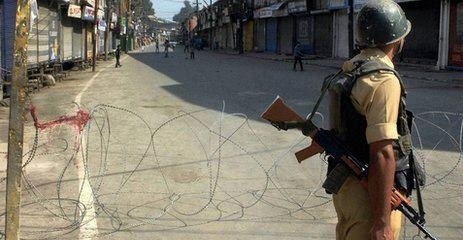Inam Bukhari
Kashmir could be facing another bout of strike calls in the immediate future over the issue of alleged construction of a pucca road to the Amarnath cave shrine up in the Himalayas.
Separatist leaders have set up a panel to chalk out startegies for the course of actions, but we cannot help but wonder how much effect, if any, it will have on the Indian establishment and how much will the Calendar, as it is popularly known, impact a common Kashmiri ranging from a businessman to a daily wager, or from a street hawker to a bus conductor who feed their family by meagre earning in the day.
Hartal, according to Wikipedia, is a voluntary and peaceful disobedience by the citizens where they refuse to go to work, schools, open shops, and carry out other governmental and institutional work. It is a type of strike popularised by Mohandas Gandhi as a mechanism of protest against some of the laws, amendments, and policies implemented by the British at the time when India was under their occupation. It is also used get some necessary demands met.
The primary objective of a hartal is to a) create awareness among the people, particularly government, about a policy/law that is apparently unfair to the citizens,
b) generate sympathy among certain government bodies to take action and
amend the law or withdraw the policy, and
c) to show the government that the citizens are a part of the movement, which makes it an obligation for a government that was chosen by same citizens to change the status quo.
‘Context’
Now, having said all that we have to place our hartals in the above framework and analyze them with respect to the Kashmir Issue. Do we really need to create more awareness about the happenings in Kashmir; the world knows about the ‘K issue’, in fact it has become a buzzword for many summits and meetings around the world, and surely a cruel joke at other private parties.
Second, during a gazillion of hartals in this land, the amount of ‘sympathy’ that India has showered on us is written in blood and engraved on unmarked graves. Finally, it is increasingly appearing that hartals are a one man show without consideration given to ordinary people and their aspirations.
However, some believe that there is no other way to show the resistance as the other popular option – the armed struggle – has not reaped any benefit in the past and has been rife with controversies.
Moreover, all leaders unanimously agree on one thing and that is a non violent, gun-free struggle. Many others argue that if Gandhi and other renowned leaders could achieve a lot by means of hartals and shutdowns why can’t we?
‘Bankruptcy of ideas?’
So, the argument continues – is this the best we Kashmiris can come up with; hartal calls and stone pelting sessions. Or is it just a mechanism for our so called leaders to remain in the limelight while their dwindling political career breathes last.
Also, is hartal the best strategy for the modern day revolutionaries or is it just the easy way out for us to show how victimized we are. We are short of strategies and tools, and believe that uploading a photo of an army-man beating an innocent person during a hartal on Facebook ensures justice to the victims. No, playing with pictures on Facebook is never the same as is action in real.
Nevertheless, our separatist corner has started to strategise the struggle differently and is diversifying beyond hartals and chalos, which includes penning down of an autobiographical memoir making people more aware about how it all started and what went wrong during the course of time, and talking actively about the daily hardships faced by commoners in their daily lives, like LPG and fuel crises.
‘Economic independence’
I have heard that once Sheikh Mohammad Abdullah, when he lived for the freedom of Kashmir, advised Kashmiris to boycott Indian vegetable and other edible commodities, and to plant potatoes instead to survive. For this advice many used to call him ‘aelwe bab’ (potato father).
But, it was more like the Boycott Movement launched by Gandhi that had an impact on the British economy. The same may hold true in the present day scenario as well.
Few years ago when Srinagar-Jammu highway was blocked by a handful of people, Kashmiris almost starved to death because that highway is the only operational road-link that connects Kashmir to the rest of India and by its blockage we realized how much we are dependent on the products that come from outside Kashmir – not chips and cold drinks, but the essential commodities like rice and vegetables.
So, if our leaders can create an awareness of economic independence that would be a way forward in achieving our goal. Moreover, there has to be increase in the awareness among the motivated youth of the importance of political education so that they can become true representatives of their homeland. We want more creative minds who harness their anger constructively rather than hot-heads who are ready to smash everything that comes in their path by stones.
Every freedom struggle has many characteristic features put together to form a formidable unit.
Unfortunately our freedom struggle has come down to hartal calenders and broken window panes. Our youth is ready to become martyrs but not scholars. Should we blame our think-tanks, whatever is left of it, or our foot soldiers for the inevitable end to the realization of the dream of Azadi!
(The author is a student of business administration. Views are his own and the organisation does not necessarily subscribe to them. Feedback at [email protected])











